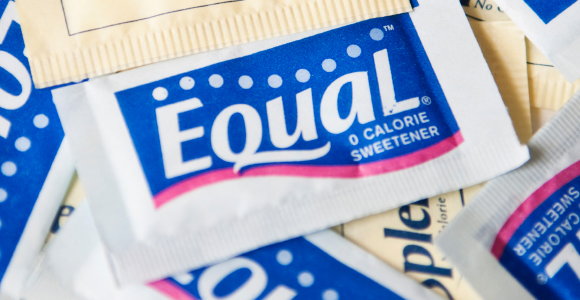Since the introduction of saccharin more than 50 years ago we've had the option of getting our sweet fix without adding calories to our day. The key to maintaining a healthy weight is keeping calories-in equal to calories-out so it seems logical that calorie-free sweeteners would help us lose weight. Why is it then that the obesity epidemic in the U.S. has coincided with an increase in consumption of these 'non-nutritive sweeteners'?
An Increase of Intake
Between 1999 and 2008, adults increased their intake of sweeteners from 20 percent of their diet to 33 percent, mainly from 'diet' beverages. Strangely, this increase did not coincide with any significant increase or decrease in their total daily calories and as mentioned before, the U.S. continued to get fatter. This paradoxical phenomenon has scientists scratching their heads.
Although sweeteners have been found safe to eat, their short and long-term effects have not been well-studied. Scientists are now wondering if sweeteners may be causing metabolic changes in the body that contribute to obesity. In studies done on rats, and a few studies done on humans, scientists have examined how sweeteners affect appetite, satiety, and hormones that contribute to weight gain. So far, none of the many mechanisms examined has shown a clear link between sweeteners and changes in the body but the research continues.
A More Plausible Explanation
It is plausible that sweeteners are somehow impacting us chemically and impacting weight. However, the current coinciding of intake and obesity likely has a broader explanation. A dramatic shift has occurred in the American diet and activity level. Research has demonstrated that in the past 50 years there has been a 'sweetening' of the American diet. Our taste preferences have changed so that high sugar foods and beverages have become the norm. At the same time our lives have become more sedentary as we take desk jobs long distances from our homes that require more driving and less walking. Slowly, our total calorie intake has increased but our energy output has decreased and the obesity epidemic has been the result.
The Spurious Relationship
As our diet got sweeter all that sugar caused weight gain. Sweeteners were a helpful food additive that allowed food companies to follow the trend of sweeter foods, while touting the foods as 'low-sugar' or 'diet.' Unfortunately the research now shows that increased sweeteners in the diet hasn't decreased our calories, it has just allowed us to eat and drink more food. The increase in sweeteners and the obesity epidemic are what we call a 'spurious' relationship. They happened at the same time, and because of the same phenomenon, but they aren't a cause and effect relationship.
A healthy diet limits sugar in order to provide calories from a balance of complex carbohydrates, protein, and healthy fats. For some people, sweeteners may be a good approach to limiting sugar intake. Sweeteners are not a substitute, however, for healthy habits that prevent overeating and promote a diet of a variety of whole foods full of vitamins and minerals. Once again we find the old mantra "balance, variety, moderation, exercise" cannot be replaced by a magic food when it comes to healthy eating.
Jennifer Webb, MS, RD, CNSC is a practicing dietitian and freelance writer based out of Southern California. She has been practicing medical nutrition therapy for the past five years. Prior to her career in nutrition, she received a degree in early childhood development. She has combined her two passions, nutrition and family, into a career educating people about the impact food can have on health across the lifespan. She is currently a dietitian at a top children's hospital and runs a private practice. Her private practice specializes in family nutrition therapy, a technique that focuses on changing family habits to lead them to lifelong healthy lifestyles. Contact Jennifer at [email protected].



